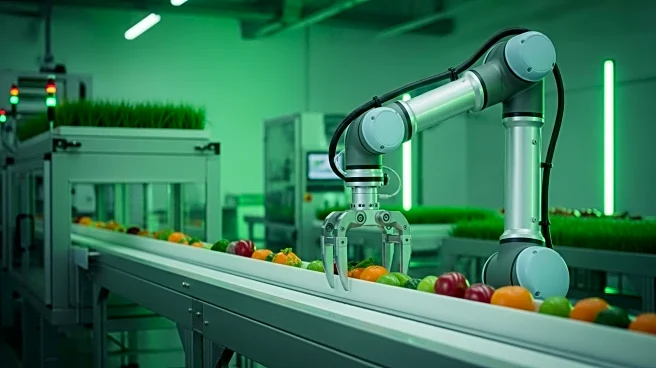What's Happening?
The recent Pack Expo in Las Vegas showcased significant trends in food and beverage manufacturing, focusing on sustainability, advanced automation, and versatility. The event attracted over 30,000 attendees and featured innovations such as Tetra Pak's new aseptic beverage containers designed for popular drinks like protein shakes and ready-to-drink coffee. These containers aim to reduce waste by ensuring more product is dispensed. GEA presented its freeze-drying capabilities, targeting emerging brands with its PowerPak 1000 thermoformer. Sustainability was a key theme, with Orbis introducing Plasticorr reusable corrugated boxes, which can be reused up to 70 times, offering a more durable alternative to traditional cardboard. Automation advancements were highlighted by Rockwell Automation's Emulate 3D Digital Twin software, which creates virtual manufacturing environments to test new configurations without physical wear on machines.
Why It's Important?
The innovations presented at Pack Expo are crucial for the food and beverage industry as they address consumer demands for sustainability and efficiency. The introduction of reusable packaging solutions like Plasticorr boxes can significantly reduce environmental impact and operational costs. Automation technologies, such as Rockwell's Emulate 3D, offer manufacturers the ability to optimize production processes, reduce downtime, and enhance productivity without the need for constant human intervention. These advancements are particularly important as companies face increasing pressure to produce diverse product sizes and cater to specific consumer needs, such as those influenced by health trends like GLP-1 drugs for weight loss.
What's Next?
The industry is likely to see continued integration of automation and sustainable practices as manufacturers strive to meet evolving consumer preferences and regulatory requirements. Companies may increasingly adopt full-line solutions, partnering with other brands to offer comprehensive processing and packaging systems. The demand for smaller pack sizes is expected to grow, driven by health-conscious consumers and those on specific medications. As these trends develop, manufacturers will need to adapt quickly to maintain competitiveness and meet market demands.
Beyond the Headlines
The shift towards automation and sustainability in food manufacturing could have broader implications for labor markets, potentially reducing the need for manual labor while increasing demand for skilled workers in technology and engineering fields. Additionally, the focus on sustainability may drive further innovation in packaging materials and waste reduction strategies, influencing environmental policies and consumer behavior.










